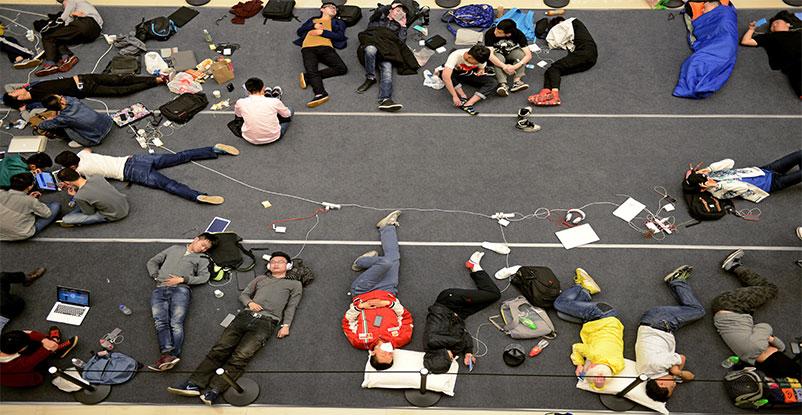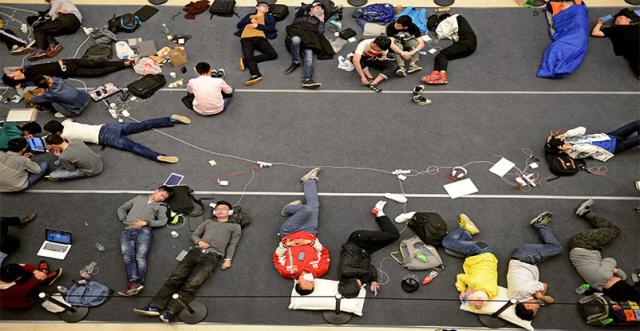“Many young people turn to loans for short-term relief, without realizing that borrowing is not an end but the start of endless problems,” Huang said.
A member of Debtor Alliance, the group on Douban, described the state of being indebted as an abyss. The lending platforms encourage borrowers to borrow more if they can repay the whole sum on time. If they cannot, they will allow installments, so people mistakenly believe that it is easy to repay the money. But high service charges and APRs easily draw borrowers who lack self-control into the abyss, several debtors told NewsChina.
Tang Long, a 28-year-old man who was stuck in debt for years, explained how one uses new loans to pay the old ones. “Once you manage to clear the debt on one platform, it authorizes a new amount which you can use to pay off loans on other platforms. But because the loan you can get on one platform gets smaller after the interest is taken out, you need to constantly explore new platforms to fill in the holes,” Tang said.
“Sometimes it took so much effort to get some money after strenuous stitching and mending here and there, it gave me the illusion that it was my hard-earned money, and I didn’t need to pay it back.”
“It’s a labyrinth and it’s hard to escape,” Huang said. Unlike credit cards that usually have an interest-free period, cash loans have no such buffer and it is almost impossible for many to cope with the ever-expanding repayments. “Some collapse under the pressure,” he said.
At the most difficult time, Xiaoying said she could not find even 300 yuan (US$46) to pay an installment. In crisis, she sold her mobile phone and took out an infamous “714 missile” loan, which comes due in seven or 14 days with high interest and overdue charges. For a loan of 2,000 yuan (US$309), borrowers need to pay back 2,500 yuan (US$386) in seven days with overdue charges reaching 5,000 yuan (US$772) a month, Tang said. “To reach this point, debtors are already at the end of their rope,” Tang said.
In December 2019, a 25-year-old woman from Anshan, Northeast China’s Liaoning Province killed her mother, then tried to kill herself in desperation after realizing it was impossible to pay back her loans.In February 2019, a 21-year-old woman from Xi’an, Shaanxi Province jumped to her death after having tried for three years to clear her loans. When she died, she still owed more than 100,000 yuan (US$15,430), her father discovered. In October 2020, a young couple killed themselves by burning charcoal in their rented room in Nanjing, Jiangsu Province. They were both from underprivileged families and involved in online lending disputes. Such tragedies have become more common and have considerably dented the reputation of the once highly regarded business.
Now that all his loans are overdue, Li Qiyuan said he has given up paying back for the time being. That is the attitude of many debtors after they tried in vain to clear their debts, NewsChina learned. Xu Shoucheng, who owes 410,000 yuan (US$63,263) to platforms because of out-of-control spending, said the constantly mounting interest makes him see no hope of “reaching the shore,” which in the parlance of debtors, means clearing their debts.
In the Debtor Alliance group, swindlers lurk in wait for a chance to cheat even more money from these young debtors by pretending to help, according to Xiaoying. The swindlers claim to provide services like helping them rebuild their credit rating or protecting their contacts from being harassed by debt collectors. “It is easy for desperate debtors to be tricked and fall into another trap.”
Xiaoying is still going all out to pay her debts, though it is tough. In 2018, a debt collector called Xiaoying’s mother after one loan was overdue, which put a lot of pressure on her. She stopped borrowing and quit her job in Dalian, Liaoning Province to go to Shanghai in July 2019 to earn more, and worked part-time jobs at night. But when her family needed money later, she started borrowing again after lending all her savings to her family. Following her mother’s advice, Xiaoying decided to put an end to the vicious cycle of using new loans to pay old ones. She stopped paying the lending platforms in December 2020 and is focused on repaying her credit cards first. “Now three quarters of my salary goes to paying debts. It will take me about three years to clear it at this rate,” she said.
“There’s no shortcut to getting ashore. The most important thing is to wean oneself off the habit of overspending and resist the temptations of online lending platforms,” said Liu Xiang. To quit her shopping addiction, Xiaoying has unlinked her credit cards from shopping platforms and only pays with cash.
Li Mengxi, who gets only 1,500 yuan (US$232) a month from her parents to cover her expenses at college, is busy tutoring in her spare time and on weekends. She’s trying to control her shopping and has limited her cosmetics and clothing purchases to the most basic and cheapest.
When Li shared her debt story online, many offered to help clear her debts but she declined. After half a year, she has repaid over 14,000 yuan (US$2,160) and planned to find another part-time job over the winter vacation. “I want to choose the path that appears the hardest but actually is the most dependable – saving every bit on my own,” Li said.

 Old Version
Old Version



